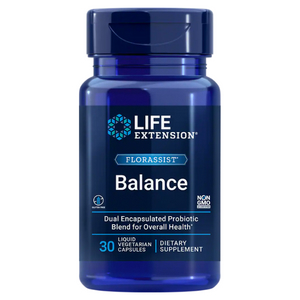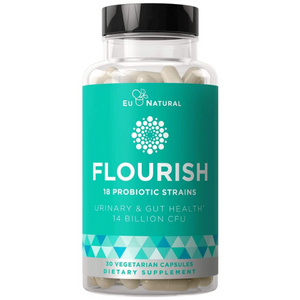Best Probiotic For IBS: Top 5 Probiotic Supplements In 2024
All articles are produced independently. When you click our links for purchasing products, we earn an affiliate commission. Learn more about how we earn revenue by reading our advertise disclaimer.
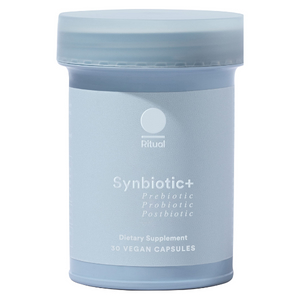
Ritual Synbiotic+
- 11 billion colony-forming units (CFUs)
- Features prebiotics, probiotics, and postbiotics
- Gluten-free, vegan
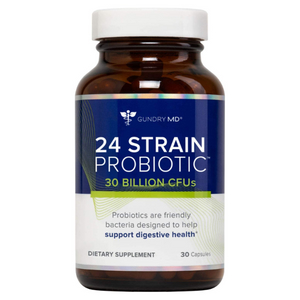
Gundry MD 24 Strain Probiotic
- 24 unique strains of probiotics
- 30 billion CFUs per capsule
- Vegetarian, gluten-free, dairy-free
Exclusively With Our Above Ambassador Link
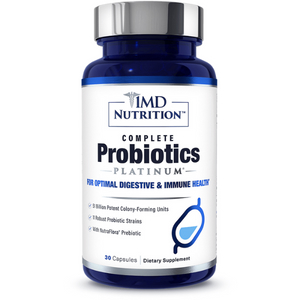
1MD Nutrition Complete Probiotics
- 51 billion CFUs
- 11 different probiotic strains
- Includes prebiotics that help feed the beneficial bacteria
People diagnosed with irritable bowel syndrome (IBS) suffer tremendously, underscoring the importance of finding a diet that doesn’t cause flares. Unfortunately, they often have issues with finding the best diet that works for them and figuring out which supplements they should take. They are often on the lookout for what is the best probiotic for IBS as well as which probiotic foods they should be adding to their diet.
IBS is a name for a group[1] of uncomfortable symptoms that affect your digestive tract. These symptoms include excessive gas, bloating, abdominal pain, diarrhea, constipation, indigestion, cramps, nausea, and even heartburn. IBS (note the “S”) is called a syndrome because it is based on symptoms, instead of pathology, such as the inflammation seen in Inflammatory Bowel Diseases (IBD; note the “D”), ulcerative colitis and Crohn’s disease. Being a syndrome and not a disease does not mean it’s trivial; it is certainly not.
IBS is usually differentiated into three different types:
- IBS – C – irritable bowel syndrome with constipation
- IBS – D – irritable bowel syndrome with diarrhea
- IBS – M – irritable bowel syndrome with mixed presentations (diarrhea alternating with constipation) of bowel movements
Best Probiotic For IBS On The Market In (April. 2024)
- Ritual Synbiotic+ – Editor’s Choice
- Gundry MD 24 Strain Probiotic – Best Probiotic Strain Variety
- 1MD Nutrition Complete Probiotics – Most Powerful
- Life Extension FLORASSIST Balance – Best Budget-Friendly
- EU Natural FLOURISH Probiotics Gut & Digestive Health – Best Clean Ingredients
What Are Probiotics?
Humans carry bacteria in their gut which serves a symbiosis. Probiotics are a group[2] of live bacteria that are considered to be beneficial to your health, like the “good” bacteria we need. Their goal is to balance out the gut flora (“good” > “bad”) in your intestines and help strengthen your immune system. Some foods like fermented vegetables and dairy have naturally-occurring probiotics, but when people are dealing with gastrointestinal issues and disorders, they are usually encouraged to take probiotic supplements.
There are plenty of different strains[3] of probiotic bacteria, but the most common include Lactobacillus and Bifidobacteria. These are the ones you’ll usually encounter in most probiotic supplements on the market. And although different strains address different health conditions, these two have been the most versatile and easily acceptable by the human body.
The association among pre-, pro-, and postbiotics can be confusing. Prebiotics are basically the fiber that probiotic bacteria eat and thrive on; postbiotics are the waste left behind from digesting the prebiotics and probiotics. More than just refuse, they include nutrients like vitamin B and vitamin K, amino acids, and peptides that inhibit the “bad” bacteria.
Do Probiotics Help IBS?
Probiotics for IBS can do wonders in terms of helping restore and replenish good and healthy gut flora. Studies[4] have shown probiotics might improve overall unpleasant and painful symptoms of irritable bowel syndrome. Specifically, a probiotic strain of Bifidobacteria called Bifidobacterium bifidum (MIMBb75)[5] has shown a great ability to adhere to intestinal cells and help improve the gut microbiome.
Although the exact cause of IBS remains unknown, these probiotic strains are known to help at least diminish the intensity of IBS symptoms and improve your quality of life. People with IBS often avoid social settings and events as they’re not looking forward to feeling unpleasant symptoms after they eat food that isn’t specifically prepared for them.
5 Best Probiotics For IBS To Use In 2024
Ritual Synbiotic+
Ritual Synbiotic+ is the ultimate three-in-one probiotic supplement to improve your gut health and replenish your good bacteria.
- 11 billion colony-forming units (CFUs)
- Features prebiotics, probiotics, and postbiotics
- Gluten-free, vegan
- Expensive
- Only available online
If you’re looking for a one-stop-shop probiotic supplement, Ritual Synbiotic+ is a great option. With 11 billion CFUs from the most clinically-studied probiotic strains, Lactobacillus rhamnosus and Bifidobacterium animalis, prebiotics that feed the bacteria and postbiotics[6] to help with absorption and improving your gut lining, this formula aims to reshape your relationship with your gut.
All you need is one capsule per day, and its capsule is designed to get the bacteria to your colon without getting destroyed in your stomach; thus, you can get the probiotics and beneficial bacteria where you need them the most. The bottle it’s packaged in is made with moisture-controlled technology so neither of your probiotic strains will be damaged.
Their formula is gluten-free, vegan, third-party tested and made without any genetically modified organisms (GMOs) or artificial ingredients. These capsules don’t require refrigeration and a large number of satisfied customers prove their value.
Gundry MD 24 Strain Probiotic

Gundry MD is a well-known brand for potent and powerful products and their 24 Strain Probiotic is no different! If you’re aiming for variety, this might be your best choice.
- 24 unique strains of probiotics
- 30 billion CFUs per capsule
- Vegetarian, gluten-free, dairy-free
- Expensive
Whether you’re looking for the best probiotic for IBS with constipation or diarrhea, this powerful combination of 24 different strains of probiotics is designed to help ease even the most severe IBS symptoms to help you find some relief.
With 30 billion CFUs per capsule and only minimal other ingredients, the Gundry MD 24 Strain Probiotic has a very clean formula that’s gluten-free, suitable for vegetarians, and doesn’t contain any artificial fillers, bulking agents, or sweeteners.
It’s designed to help manage digestive balance and stool frequency, prevent small intestine bacterial overgrowth, and encourage good bacteria to thrive in your gut microbiome.
1MD Nutrition Complete Probiotics
If you’re looking to get digestive and intestinal relief from irritable bowel syndrome or any other gastrointestinal issue, 1MD Nutrition Complete Probiotics might be a great option.
- 51 billion CFUs
- 11 different probiotic strains
- Includes prebiotics that help feed the beneficial bacteria
- Might be too strong for someone who’s never taken probiotic supplements before
1MD Nutrition Complete Probiotics Platinum® is designed for broad-spectrum health and therefore targets all major gastrointestinal issues, including IBS symptoms. Made with 51 billion CFUs from 11 different probiotic strains, this is a very powerful and potent supplement that is doctor-recommended and comes in a delayed-response capsule so the bacteria actually reach your intestines and gut microbiota.
The formula is made without any unnecessary artificial ingredients, fillers, thickening agents, or colors, and it’s on the affordable side. Although individual experiences vary, many satisfied customers report noticing relief in just a few hours after taking this supplement.
Life Extension FLORASSIST Balance
Life Extension FLORASSIST Balance aims to promote overall digestive health by providing support to your immune system through seven probiotic strains.
- Liquid vegetarian, dual-encapsulated capsules
- Seven strains of Lactobacillus and Bifidobacterium probiotics
- Affordable
- Contains maltodextrin[7] which may cause digestive issues in some people, although this is based on animal studies.
Life Extension FLORASSIST Balance contains seven strains of Lactobacillus and Bifidobacterium probiotics that aim to replenish your gut flora and relieve the most common symptoms of gastrointestinal disorders such as abdominal pain and diarrhea.
Made with dual-encapsulation technology, this blend is protected when it passes through the harsh and acidic stomach environment, staying intact until it hits your intestines. They help support and strengthen your immune system by lowering inflammation and helping you fight off infections more successfully.
This product is one of the most affordable probiotic supplements on the market, and therefore it’s a great option for anyone with unpleasant gastrointestinal symptoms, whether dealing with irritable bowel syndrome or not.
EU Natural FLOURISH Probiotics Gut & Digestive Health
If you’re very picky with your supplements and only want the best and cleanest ingredients, EU Natural FLOURISH Gut & Digestive Health is for you. Due to its clean ingredients, it may be the best probiotic for IBS and GERD.
- 18 strains of probiotic bacteria
- Lab-tested
- Vegetarian capsules made without artificial ingredients, gluten; and major allergen-free
- Only available online
Made with only the cleanest ingredients, EU Natural FLOURISH Probiotics Gut & Digestive Health is a great probiotic blend for IBS patients as well as anyone else who is looking to balance their gut microbiota.
Containing 14 billion CFUs from 18 different strains of probiotic bacteria, this formula is potent, powerful, and made without any artificial ingredients or fillers. The capsule is also vegetarian and gluten-free so you can stay safe knowing there are no wheat or animal byproducts.
Their probiotic-packed blend is lab tested to ensure potency and purity and it’s also made in a facility registered with the Food and Drug Administration (FDA) that allows inspection, should the FDA desire. The vegetarian, delayed-response capsule ensures the bacteria actually gets into the intestines and contributes to the gut flora instead of getting damaged by the strong acid environment in your stomach.
Benefits Of Probiotics For IBS
The aforementioned studies have been very helpful to those with IBS symptoms, citing great success in reducing abdominal pain and bloating, gas, as well as preventing diarrhea and regulating bowel movements.
Moreover, some studies found that even inactive[8] probiotics might still have health benefits in those with IBS and improve their gut health while lowering the intensity of their IBS-related symptoms.
Additionally, probiotics have also shown great success in lowering overall inflammation[9] in the body as well as strengthening the immune system and your immune response, helping fight off infections and harmful agents.
How To Choose Probiotics To Treat IBS?
The best probiotics to treat IBS need to have certain characteristics that will ensure you’re getting the best quality and actually feeling the relief of your IBS symptoms. These include
- High number of CFUs helps balance your gut flora and displace the harmful bacteria
- Lactobacillus and Bifidobacterium strains – the more strains aren’t always the merrier, but these two important probiotics are the most researched and have proven to be the most beneficial in treating IBS symptoms as well as all other gastrointestinal issues.
- No artificial ingredients – the probiotic blend should be free of any artificial fillers, binding agents, bulking agents, colors, or sweeteners.
- No gluten, dairy, allergens, GMOs – additionally, the formula should be as clean as possible and contain zero allergens or other ingredients that might create further digestive discomfort, abdominal pain, or inflammatory reactions.
- Additional prebiotics – prebiotics is substances that help feed the gut bacteria and help maintain their high levels in your intestinal microflora. Choose brands that have a prebiotic blend in the formula.
- Third-party-tested – this ensures purity, potency, and overall high quality of probiotics found in the capsule. Some brands have in-house labs while others perform their testing elsewhere. The latter is always a better option as it’s unbiased and will give the most accurate results.
- Time-delayed capsule – every probiotic strain is very unstable and can easily be destroyed by the acid in your stomach before it even reaches the rest of your gastrointestinal tract. Time-delayed capsules help protect the probiotics and allow them to reach your intestines intact.
Alternatives Choices
Alternative choices to probiotic supplements are probiotic foods that naturally contain beneficial bacteria. The most commonly used probiotic foods include
- Kefir and yogurt
- Natto
- Kimchi
- Kombucha
- Sauerkraut
- Other pickled and fermented vegetables
- Sourdough
These foods naturally[10] contain beneficial bacterial strains that have been shown to promote overall health and help anyone who is dealing with digestive issues as well as IBS patients.
Final Thought
Irritable bowel syndrome is one of the most confusing (to doctors, too!), but a very broad range of unpleasant gastrointestinal symptoms. From abdominal pain and diarrhea to extreme gas, constipation, and bloating, these symptoms can easily be a sign of plenty of different health conditions. When doctors can’t really pinpoint the cause or blame it on food intolerance, they often revert to IBS.
Still, even though the exact root cause isn’t known, we do know that certain foods might trigger these symptoms and that one of the main problems IBS patients experience is an unbalanced gut microbiome. These probiotic supplements bring on a plethora of beneficial gut bacteria and may be a great place to start and find much-needed relief.
Frequently Asked Questions
Yes, although there are no specialized probiotics designed to treat specific IBS symptoms, specifically. Nevertheless, anyone and everyone might benefit from taking probiotics, which includes those who suffer from IBS.
Sometimes they might be enough to experience relief, but you should never start a supplement or replace it for therapy without a green light from your doctor.
Probiotic supplements are generally considered safe, but they might not work for everyone. Every person is different and so is their gut microbiome. That’s why it’s often times trial-and-error to check and see what works best for you and your specific needs.
Probiotics are strains of good bacteria, and prebiotics are substances that help feed the bacteria and maintain its numbers. That’s why they’re both necessary and important for those struggling with IBS.
+ 10 sources
Health Canal avoids using tertiary references. We have strict sourcing guidelines and rely on peer-reviewed studies, academic researches from medical associations and institutions. To ensure the accuracy of articles in Health Canal, you can read more about the editorial process here
- Cleveland Clinic. (2020). Irritable Bowel Syndrome: IBS, Symptoms, Causes, Treatment. [online] Available at: https://my.clevelandclinic.org/health/diseases/4342-irritable-bowel-syndrome-ibs
- Genome.gov. (2022). Bacteria. [online] Available at: https://www.genome.gov/genetics-glossary/Bacteria
- Bianco, A. and Ramunno, A. (2006). The Chemistry of Olea Europaea. Studies in Natural Products Chemistry, [online] pp.859–903. doi:10.1016/s1572-5995(06)80042-6.
- Lembo, A. (2020). Probiotics — even inactive ones — may relieve IBS symptoms – Harvard Health. [online] Harvard Health. Available at: https://www.health.harvard.edu/blog/probiotics-even-inactive-ones-may-relieve-ibs-symptoms-2020062220303#:~:text=Probiotics%20may%20relieve%20symptoms%20of,flatulence%2C%20in%20people%20with%20IBS.
- Guglielmetti, S., Mora, D., Gschwender, M. and Popp, K. (2011). Randomised clinical trial: Bifidobacterium bifidum MIMBb75 significantly alleviates irritable bowel syndrome and improves quality of life — a double-blind, placebo-controlled study. Alimentary Pharmacology & Therapeutics, [online] 33(10), pp.1123–1132. doi:10.1111/j.1365-2036.2011.04633.x.
- Golen, T. and Ricciotti, H. (2021). What are postbiotics? – Harvard Health. [online] Harvard Health. Available at: https://www.health.harvard.edu/nutrition/what-are-postbiotics#:~:text=So%2C%20what%20are%20postbiotics%3F,the%20growth%20of%20harmful%20bacteria.
- Kendig, M.D., Lin, C.S., Beilharz, J.E., Rooney, K.B. and Boakes, R.A. (2014). Maltodextrin can produce similar metabolic and cognitive effects to those of sucrose in the rat☆. Appetite, [online] 77, pp.1–12. doi:10.1016/j.appet.2014.02.011.
- Andresen, V., Gschossmann, J. and Layer, P. (2020). Heat-inactivated Bifidobacterium bifidum MIMBb75 (SYN-HI-001) in the treatment of irritable bowel syndrome: a multicentre, randomised, double-blind, placebo-controlled clinical trial. The Lancet Gastroenterology & Hepatology, [online] 5(7), pp.658–666. doi:10.1016/s2468-1253(20)30056-x.
- Cristofori, F., Dargenio, V.N., Dargenio, C., Miniello, V.L., Barone, M. and Francavilla, R. (2021). Anti-Inflammatory and Immunomodulatory Effects of Probiotics in Gut Inflammation: A Door to the Body. Frontiers in Immunology, [online] 12. doi:10.3389/fimmu.2021.578386.
- Rizzoli, R. (2014). Dairy products, yogurts, and bone health. The American Journal of Clinical Nutrition, [online] 99(5), pp.1256S1262S. doi:10.3945/ajcn.113.073056.

